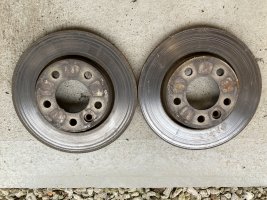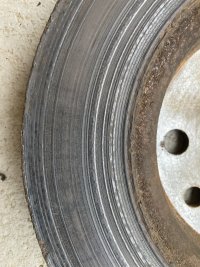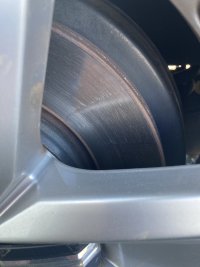Sandyvan
Bagman Jim do you have any photos?
We are currently having an air-con service and idler pully changed, the later is the latest recall apparently. During the free vehicle health check the technician has said the rear brake pads have considerable corrosion (something I had noticed earlier) and they are saying the discs and pads could be replaced at a cost of £275.00 plus VAT. Now our Cali is just two years old and has less than 7000 miles on it. I feel this is a warrenty job but brakes are not covered even though in my opinion the brake discs must be inferior to be in the state they are. The vehicle has never seen road salt and I appreciate that not using a vehicle isn't ideal but I find this unacceptable.
Before anyone comes on here and berates me for not using the Cali for what it was designed for I was diagnosed with bowel cancer shortly after buying it and am currently undergoing chemo which really cramps your style!
From my brief days with metalworking I was told that cast iron is very rust resistant. Milder steel with a higher Friction coefficient was introduced wi5h 5ge removal of asbestos from pad manufacture.
From my brief days with metalworking I was told that cast iron is very rust resistant. Milder steel with a higher Friction coefficient was introduced wi5h 5ge removal of asbestos from pad manufacture.
The discs are indeed cast iron not steel as stated. Steel would make a poor disc brake. What has changed is the grade of cast iron to a lower grade. The last car I had with quality factory CI discs was my R129 mercedes still going strong after 5 years irrespective of the use, everything I have owned since then is lower quality. Doesnt apply to motorbikes btw.
Makes me wonder if the poorer grade cast iron also applies to quality aftermarket discs ... e.g. Brembo or Pagid? & whether they do road rather than track grade pads?
We are currently having an air-con service and idler pully changed, the later is the latest recall apparently. During the free vehicle health check the technician has said the rear brake pads have considerable corrosion (something I had noticed earlier) and they are saying the discs and pads could be replaced at a cost of £275.00 plus VAT. Now our Cali is just two years old and has less than 7000 miles on it. I feel this is a warrenty job but brakes are not covered even though in my opinion the brake discs must be inferior to be in the state they are. The vehicle has never seen road salt and I appreciate that not using a vehicle isn't ideal but I find this unacceptable.
Before anyone comes on here and berates me for not using the Cali for what it was designed for I was diagnosed with bowel cancer shortly after buying it and am currently undergoing chemo which really cramps your style!
There are various grade pads available. eg Green stuff do ones suitable for road-fast road/competition - Race. Discs have become ,softer, after asbestos was banned from pads as non asbestos content pads have less friction-stopping power on the harder discs.Makes me wonder if the poorer grade cast iron also applies to quality aftermarket discs ... e.g. Brembo or Pagid? & whether they do road rather than track grade pads?
The service department use a traffic light system, and the Health Check showed RED on this report, but there was no advisory on the MoT.I would say Yes. Discs build up surface rust very quickly if a van is not used every day as they are exposed to the elements. Just take it on hilly run and give them some use.
Did it come as an advisory on last MOT?
No, it's just modern brake discs I'm afraid. They are sacrificial like brake pads and not under warranty and work fine if used as a commercial T6 is normally used - every day.So for the obvious question, “is the technician trying to generate a sale by falsifying the state of my brakes?”
I'm afraid it doesn't matter what the Caravelle is registered as. It is based on a Transporter, a commercial vehicle and has basically the same mechanicals, engine, suspension, drive train and brakes. Commercial vehicles are normally used everyday and certainly rarely parked for days,weeks or months at a time.Hi, Tim T,
Agree with your point that a seized caliper would be seized ON.
Your experience of a third set of rear discs at 45K does surprise me. I would expect wear to be similar to my previous VW Touran - 55K on clock at 9-years old, and still OK at final service during my ownership. Caravelle is used under same conditions as the Touran. Caravelle is not truly a “van” - V5 classes it as a diesel car, and insurance companies rate it as either a large MPV or a large estate car.
We always yearned for a Caravelle (being caravanners), but I’m afraid our enthusiasm is going a bit off the boil. “We buy any car.com” have rated the value of the Caravelle at £28,700, so selling it is a temptation.
The COVID situation plus my having vascular surgery on my leg (lucky not to lose it!), my active ability has been very much restricted, and we have considered changing to a small motorcaravan. Hard to finally decided, though!
Your experience of a third set of rear discs at 45K does surprise me. I would expect wear to be similar to my previous VW Touran - 55K on clock at 9-years old, and still OK at final service during my ownership. Caravelle is used under same conditions as the Touran. Caravelle is not truly a “van” - V5 classes it as a diesel car, and insurance companies rate it as either a large MPV or a large estate car.
1. You cannot change the M1 or N1 classification on your V5c so Insurance companies will not change.A VW Caddy is a commercial vehicle, but is based on the Touran. Regardless of class (private or commercial) the general specification of the mechanics is common to either. From a commercial point of view, certain components will be more robust - suspension, tyres, brakes and the like. A vehicle doesn’t “know” what working life it is designed nd, in fact, a commercially-based vehicle will have many of its components designed to deal with a rougher life than a private vehicle. Also, the longevity of components will not become shorter for a commercially-based vehicle just because it works in a private-use environment. Large motor homes are built on commercial chassis and are generally known for their very low mileage and stationary time over a number of years, but they do not have a history of critical and mechanical deterioration as a result of lengthy periods of idleness.
I do not have a second vehicle, so my Caravelle suffers no more idleness than a standard motorcar where retirement results in a much lower annual mileage.
As I have said, my Caravelle is registered as a diesel car, insurance companies class it as either a large MPV or large estate car. I did once explore the possibility of insuring it as a van, for the purpose of cheaper premium, but insurers refuse to accept a van classification.
In fact, VW only include Caravelles and Californias in their commercial vehicle range because it suits their production line arrangements.
If you have an independent garage that you trust and can build a relationship with, I see no reason to not to use them.Well, there’s a surprise! Caravelle went in for its annual service. Under their traffic light system, health check showed amber for rear brake pads to be changed at next service. No advisories on MoT.
As for the supposed “brake disc corrosion”, not a mention of this for this service.
Timing belt change, plus water pump, was about £450, and receptionist told me it will be £750 next time !!! They must plan their increases well ahead.
That will be 5-years forward, and current service plan will have expired. Am considering another independent VW garage - our daughter changed her VW camper service from VW franchise to this garage due to dissatisfaction, and our son’s neighbour has been taking his VW to this garage for years, and he’s fussy over his cars.
The service department use a traffic light system, and the Health Check showed RED on this report, but there was no advisory on the MoT.
When I questioned the technician (by phone) he sent me a photo on my phone. It was not very clear, as it was a view taken through the wheel spokes. This puzzled me because, if there was anything significant, surely this snapshot should have been taken with the wheel removed.
I take the point about a vehicle standing for a few days, but I don’t think there is a significant exposure to the elements. I previously mentioned discs drying quickly because of being hot at the end of a journey (even a short one), and the vehicle standing in the open will usually suffer less humidity than one put into a garage when still wet.
The vehicle goes in for its annual service on June 1st - next Wednesday - so will see how things go in the next few days.
I too have been down this road so to speak.The service department use a traffic light system, and the Health Check showed RED on this report, but there was no advisory on the MoT.
When I questioned the technician (by phone) he sent me a photo on my phone. It was not very clear, as it was a view taken through the wheel spokes. This puzzled me because, if there was anything significant, surely this snapshot should have been taken with the wheel removed.
I take the point about a vehicle standing for a few days, but I don’t think there is a significant exposure to the elements. I previously mentioned discs drying quickly because of being hot at the end of a journey (even a short one), and the vehicle standing in the open will usually suffer less humidity than one put into a garage when still wet.
The vehicle goes in for its annual service on June 1st - next Wednesday - so will see how things go in the next few days.



I assume you mean the “hand wash” type of operation. I used to use the automatic car wash when I had my Touran, but haven’t used one for my Caravelle as Sainsbury’s (my usual wash centre) had a notice banning transit-sized vehicles; due to, I believe, an incident where such a vehicle became fouled up with the rotating brush mechanism.Also stay away from those drive through car washes as the guys use an acid to clean brake dust off wheels which corrodes the discs and speeds the process up

The VW California Club is the worlds largest resource for all owners and enthusiasts of VW California campervans.

